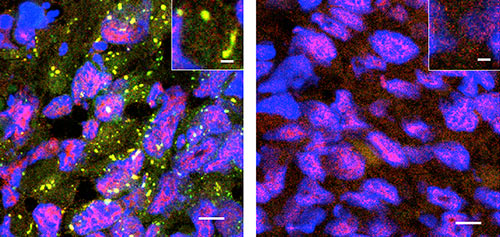Under adverse conditions, healthy cells and tumor cells alike form stress granules, clumps of mRNA and protein that are stashed away for later use. Although it has been known that stress granules can healthy cells and tumor cells survive oxidative and metabolic stress or hypoxia, it has become apparent only recently that tumors that produce more stress granules are more likely to metastasize.
The new result appeared March 23 in The Journal of Cell Biology, in an article entitled, “YB-1 regulates stress granule formation and tumor progression by translationally activating G3BP1.” This article, the work of scientists at the University of British Columbia, explained how two proteins, Y-box binding protein 1 (YB-1) and a stress granule protein, G3BP1, facilitate stress granule formation.
Previously, YB-1 had been known to localize to stress granules, but exactly how YB-1 participated in stress granule formation remained mysterious. The University of British Columbia scientists, led by Paol Sorensen, M.D., Ph.D., however, found that YB-1 attaches to the mRNA encoding G3BP1 and stimulates the protein’s production.
“YB-1 directly binds to and translationally activates the 5′ untranslated region (UTR) of G3BP1 mRNAs, thereby controlling the availability of the G3BP1 SG nucleator for SG assembly,” wrote the authors. “YB-1 inactivation in human sarcoma cells dramatically reduces G3BP1 and SG formation in vitro. YB-1 and G3BP1 expression are highly correlated in human sarcomas, and elevated G3BP1 expression correlates with poor survival.”
To determine the effects of YB-1 in animals, the researchers implanted mice with cancer cells that either made or lacked the protein. A month later, cells in the control tumors carried more stress granules than did the tumor cells missing YB-1. Sorensen and colleagues then implanted mice with tumors that either produced or lacked G3BP1. The control tumors harbored more stress granules than did the G3BP1-deficient tumors, and only the control tumors metastasized.
The authors of The Journal of Cell Biology article wrote, “G3BP1 down-regulation in sarcoma xenografts prevents in vivo SG formation and tumor invasion, and completely blocks lung metastasis in mouse models.”
Further research is needed to find out how the reduction in stress granules curbs metastatic spread, but the results suggest that inhibiting their formation might be a way to curb cancer metastasis.


